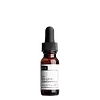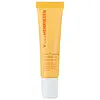What's inside
What's inside
 Key Ingredients
Key Ingredients

 Benefits
Benefits

 Concerns
Concerns

 Ingredients Side-by-side
Ingredients Side-by-side

Caprylic/Capric Triglyceride
MaskingC13-16 Isoparaffin
SolventC12-15 Alkyl Benzoate
AntimicrobialPentaerythrityl Tetraisostearate
EmollientHydrogenated Polyisobutene
EmollientCetearyl Ethylhexanoate
EmollientOleic/Linoleic/Linolenic Polyglycerides
EmollientPentaclethra Macroloba Seed Oil
EmollientSilica Dimethyl Silylate
EmollientMethyl Nicotinate
SoothingEthylhexyl Palmitate
EmollientDimethyl Isosorbide
SolventPongamia Glabra Seed Oil
Skin ConditioningPalmitoyl Hexapeptide-12
Skin ConditioningPalmitoyl Tripeptide-1
Skin ConditioningPalmitoyl Tripeptide-38
Skin ConditioningSodium Hyaluronate
HumectantGlucomannan
Skin ConditioningCommiphora Mukul Resin Extract
Skin ConditioningSesamum Indicum Seed Extract
Skin ConditioningPortulaca Pilosa Extract
Skin ConditioningAnemarrhena Asphodeloides Root Extract
Skin ConditioningHippophae Rhamnoides Fruit Oil
Skin ProtectingHydroxymethoxyphenyl Propylmethylmethoxybenzofuran
Skin ConditioningPlukenetia Volubilis Seed Oil
EmollientTrihydroxystearin
Skin ConditioningSorbitan Isostearate
EmulsifyingPropylene Carbonate
SolventButylene/Ethylene/Styrene Copolymer
Ethylene/Propylene/Styrene Copolymer
Stearalkonium Hectorite
Gel FormingSucrose Cocoate
EmulsifyingTocopherol
AntioxidantBHT
AntioxidantWater
Skin ConditioningCaprylic/Capric Triglyceride, C13-16 Isoparaffin, C12-15 Alkyl Benzoate, Pentaerythrityl Tetraisostearate, Hydrogenated Polyisobutene, Cetearyl Ethylhexanoate, Oleic/Linoleic/Linolenic Polyglycerides, Pentaclethra Macroloba Seed Oil, Silica Dimethyl Silylate, Methyl Nicotinate, Ethylhexyl Palmitate, Dimethyl Isosorbide, Pongamia Glabra Seed Oil, Palmitoyl Hexapeptide-12, Palmitoyl Tripeptide-1, Palmitoyl Tripeptide-38, Sodium Hyaluronate, Glucomannan, Commiphora Mukul Resin Extract, Sesamum Indicum Seed Extract, Portulaca Pilosa Extract, Anemarrhena Asphodeloides Root Extract, Hippophae Rhamnoides Fruit Oil, Hydroxymethoxyphenyl Propylmethylmethoxybenzofuran, Plukenetia Volubilis Seed Oil, Trihydroxystearin, Sorbitan Isostearate, Propylene Carbonate, Butylene/Ethylene/Styrene Copolymer, Ethylene/Propylene/Styrene Copolymer, Stearalkonium Hectorite, Sucrose Cocoate, Tocopherol, BHT, Water
Polybutene
Hydrogenated Polydecene
EmollientBis-Diglyceryl Polyacyladipate-2
EmollientHydrogenated Styrene/Isoprene Copolymer
Cera Microcristallina
Emulsion StabilisingSilica
AbrasiveRubus Chamaemorus Seed Oil
Skin ConditioningGarcinia Indica Seed Butter
Skin ConditioningEuterpe Oleracea Sterols
Skin ConditioningPalmitoyl Hexapeptide-12
Skin ConditioningPalmitoyl Tripeptide-1
Skin ConditioningTocopheryl Acetate
AntioxidantTocopherol
AntioxidantIrvingia Gabonensis Kernel Butter
Skin ConditioningCitrus Aurantium Dulcis Fruit Extract
MaskingLinoleic Acid
CleansingLinolenic Acid
CleansingOleic Acid
EmollientLactic Acid
BufferingHelianthus Annuus Seed Oil
EmollientCaprylic/Capric Triglyceride
MaskingCopernicia Cerifera Wax
Hydrogenated Coco-Glycerides
EmollientSorbitan Isostearate
EmulsifyingPentaerythrityl Tetraisostearate
EmollientPentaerythrityl Tetra-Di-T-Butyl Hydroxyhydrocinnamate
AntioxidantOctyldodecanol
EmollientEthylhexyl Palmitate
EmollientDicalcium Phosphate
AbrasiveTribehenin
EmollientPropylene Carbonate
SolventStearalkonium Hectorite
Gel FormingParfum
MaskingCitral
PerfumingLimonene
PerfumingLinalool
PerfumingIron Oxides
CI 77891
Cosmetic ColorantPolybutene, Hydrogenated Polydecene, Bis-Diglyceryl Polyacyladipate-2, Hydrogenated Styrene/Isoprene Copolymer, Cera Microcristallina, Silica, Rubus Chamaemorus Seed Oil, Garcinia Indica Seed Butter, Euterpe Oleracea Sterols, Palmitoyl Hexapeptide-12, Palmitoyl Tripeptide-1, Tocopheryl Acetate, Tocopherol, Irvingia Gabonensis Kernel Butter, Citrus Aurantium Dulcis Fruit Extract, Linoleic Acid, Linolenic Acid, Oleic Acid, Lactic Acid, Helianthus Annuus Seed Oil, Caprylic/Capric Triglyceride, Copernicia Cerifera Wax, Hydrogenated Coco-Glycerides, Sorbitan Isostearate, Pentaerythrityl Tetraisostearate, Pentaerythrityl Tetra-Di-T-Butyl Hydroxyhydrocinnamate, Octyldodecanol, Ethylhexyl Palmitate, Dicalcium Phosphate, Tribehenin, Propylene Carbonate, Stearalkonium Hectorite, Parfum, Citral, Limonene, Linalool, Iron Oxides, CI 77891
 Reviews
Reviews

Ingredients Explained
These ingredients are found in both products.
Ingredients higher up in an ingredient list are typically present in a larger amount.
This ingredient is an emollient, solvent, and texture enhancer. It is considered a skin-softener by helping the skin prevent moisture loss.
It helps thicken a product's formula and makes it easier to spread by dissolving clumping compounds.
Caprylic Triglyceride is made by combining glycerin with coconut oil, forming a clear liquid.
While there is an assumption Caprylic Triglyceride can clog pores due to it being derived from coconut oil, there is no research supporting this.
Learn more about Caprylic/Capric TriglycerideEthylhexyl Palmitate, also known as octyl palmitate, is created from 2-ethylhexyl alcohol and palmitic acid. It is a fatty acid ester.
The fatty acid content of Ethylhexyl Palmitate makes it an emollient. Emollients help soften and hydrate your skin by trapping moisture within.
Ethylhexyl Palmitate is also used to help improve the texture of cosmetics. It helps other ingredient dissolve in products and help disperse ingredients more evenly.
You'll likely find this ingredient in sunscreen, as it is often used to mix UV-blocking ingredients such as avobenzone and ethylhexyl triazone.
It can also help stabilize the fragrances in a product as a fragrance fixative.
Ethylhexyl Palmitate can be used to substitute mineral oil.
Due to its high fatty acid content, it may not be fungal-acne safe.
Learn more about Ethylhexyl PalmitatePalmitoyl Hexapeptide-12 is a synthetic peptide made with glycine, histidine, lysine, and palmitic acid.
The sequence of this peptide matches that of elastin, a key protein that plays a role in how firm our skin is.
Due to its palmitic acid base, this ingredient may not be fungal-acne safe.
Learn more about Palmitoyl Hexapeptide-12Palmitoyl Tripeptide-1 is also known as pal-GHK. It is made up of 3 amino acids and palmitic acid, a fatty acid that helps it absorb into skin more easily.
This peptide is as a signal peptide, meaning it tells the skin to produce more collagen. Collagen is the key protein that helps form the skin's structure and keep it plump, firm, and hydrated.
By boosting collagen production, this ingredient supports a stronger skin barrier and helps reduce the appearance of wrinkles.
You'll most likely see this ingredient paired with Palmitoyl Tetrapeptide-7 in the well-known Matrixyl 3000 complex. While results from in-house testing should be viewed cautiously, this peptide duo is among the most studied and widely used in modern skincare.
Due to its palmitic acid base, this ingredient may not be safe for Malassezia folliculitis.
Read more about other common types of peptides here:
Learn more about Palmitoyl Tripeptide-1Pentaerythrityl Tetraisostearate is derived from isostearic acid. It is an emollient and emulsifier.
The highest concentration of this ingredient is found in lipsticks.
This ingredient is minimally water soluble and may not be Malassezia folliculitis, or fungal-acne safe.
Learn more about Pentaerythrityl TetraisostearateThis ingredient is a solvent. It helps dissolve active ingredients and alter the texture of products.
Propylene Carbonate is commonly used in makeup and with clay, such as montmorillonite or bentonite.
Studies show this ingredient to be safe for cosmetics. When it is undiluted, it can cause skin irritation. (It is always diluted in skincare and makeup). This ingredient is water-soluble.
Propylene Carbonate is created from propylene glycol and carbonic acid.
Learn more about Propylene CarbonateSorbitan Isostearate is an emulsifer and cleaning agent. It is created from isostearic acid and sorbitol.
As an emulsifier, Sorbitan Isostearate prevents oils and water from separating.
Due to its isostearic acid base, it may not be safe for Malassezia or fungal acne.
Learn more about Sorbitan IsostearateStearalkonium Hectorite is a clay-derived ingredient used to thicken a product and help create a gel-like texture.
Tocopherol (also known as Vitamin E) is a common antioxidant used to help protect the skin from free-radicals and strengthen the skin barrier. It's also fat soluble - this means our skin is great at absorbing it.
Vitamin E also helps keep your natural skin lipids healthy. Your lipid skin barrier naturally consists of lipids, ceramides, and fatty acids. Vitamin E offers extra protection for your skin’s lipid barrier, keeping your skin healthy and nourished.
Another benefit is a bit of UV protection. Vitamin E helps reduce the damage caused by UVB rays. (It should not replace your sunscreen). Combining it with Vitamin C can decrease sunburned cells and hyperpigmentation after UV exposure.
You might have noticed Vitamin E + C often paired together. This is because it is great at stabilizing Vitamin C. Using the two together helps increase the effectiveness of both ingredients.
There are often claims that Vitamin E can reduce/prevent scarring, but these claims haven't been confirmed by scientific research.
Learn more about Tocopherol